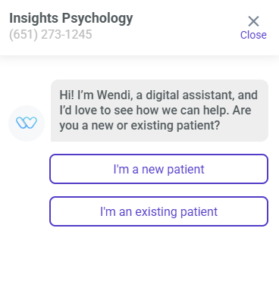Comprehensive Mental Health Services in Minnesota
At Insights Psychology, we provide comprehensive mental health services in MN for all ages. Our services include individual therapy, couples counseling, family therapy, psychological evaluations, and medication management services. You can visit us in person at our Woodbury and Bloomington clinics, or access our online telehealth services across PSYPACT states, covering 42 states in the US.
Achieve Your Potential with our Qualified Psychologists
We are just a click away from helping you identify your inner strengths and making your present meaningful. Contact us, and we will schedule you with one of our experienced therapists, whether you visit us in Woodbury, Bloomington in Minnesota, or connect with our mental health services online across PSYPACT states.
Key Services

Psychotherapy
We offer counseling to individuals, couples, and families, and top-notch therapy for children in MN and adults alike.

Psychological Evaluations
Our comprehensive evaluations are available for children, teens, and adults, provided by our skilled psychology consultants.

Medication Management
Consult with our psychiatry providers for personalized medication management.
Specialized mental health services

Your Path to Wellness Starts with Insights Psychology
We strive to create a safe and friendly environment where you will feel heard and understood. Whether you're seeking mental health services in Woodbury or need support through our Bloomington mental health services.
Help is just a click away!
At Insights Psychology, we offer services in person. Want to avoid the driving time, arrange transportation or childcare to attend your appointment? See our providers from the safety of your home using our secure telehealth services. Our scheduling and intake process is easy, smooth, and paperless.

Conditions We Can Help You With
Social Anxiety Disorder
Generalized Anxiety Disorder
Panic Disorder
Posttraumatic Stress Disorder
Depression
Perinatal Depression
Seasonal Affective Disorder
Bipolar Disorder
Grief
Relationship Challenges
Eating Disorder
Fibromyalgia
Body Dysmorphic Disorder
Chronic Pain
Attention Deficit Hyperactivity Disorder
Frequently Asked Questions
Who is a psychologist, and how can they help me?
Psychologists are professionals who study the mind and behavior. They can help individuals deal with mental health issues, mental health disorders, emotional challenges, relationship problems, and various other aspects of life. They provide therapy, counseling, and interventions for issues such as anxiety, depression, trauma, and relationship problems. Using evidence-based techniques, psychologists help individuals improve their well-being, cope with challenges, and achieve personal goals. They also conduct assessments and evaluations to diagnose mental health conditions and develop personalized treatment plans. Insights Psychology providers are psychology specialists offering services to clients in Woodbury and Bloomington in Minnesota and telehealth services for all the PSYPACT states, covering over 40 states in the US.
What is evidence-based psychotherapy?
Evidence-based psychotherapy refers to therapeutic methods and interventions scientifically tested and proven effective through rigorous research. These therapies are grounded in empirical evidence, meaning they rely on data and outcomes from studies to inform their approaches and techniques. By adhering to treatments that have been shown to work for specific disorders or problems, evidence-based psychotherapies aim to provide the most effective care possible.
Examples include Cognitive Behavioral Therapy (CBT), Dialectical Behavior Therapy (DBT), Acceptance and Commitment Therapy (ACT), Eye Movement Desensitization and Reprocessing (EMDR), Accelerated Resolution Therapy (ART), and Internal Family Systems (IFS).
What is supportive therapy and how is it helpful?
Supportive therapy is a warm, compassionate approach to therapeutic care that focuses on building a strong, supportive relationship between you and your therapist. It creates a nurturing environment fostering safety, acceptance, and understanding.
In this space, you will feel understood and valued. Supportive therapy emphasizes empathy, active listening, and unconditional positive regard. Taking the first step towards seeking help is a sign of strength, and in this journey, you are never alone.
What types of issues do psychologists address?
Psychologists help individuals confront various mental health challenges, ranging from emotional distress and cognitive barriers to interpersonal dilemmas. They offer holistic care for anxiety, depression, stress, trauma, addictive behaviors, relationship dynamics, developmental and personality complexities. They also address the interplay between mental and physical well-being.
Psychologists support motivation, self-esteem, learning strategies, and coping mechanisms. If you are experiencing such difficulties, your path to a healthier, more fulfilling life is within reach.
How do I know if therapy is right for me?
Determining if counseling or therapy is the right choice takes some thought. Ask yourself if personal issues are making life and relationships tough. Are you experiencing overwhelming feelings or feeling stuck?
Are you having difficulty navigating life transitions? If it’s hard to handle everything alone, counseling could be supportive. Talking to a therapist can provide you with answers on whether it suits your personal needs and life goals. Remember, reaching out for guidance is a sign of strength.
What's the difference between a therapist, psychologist, and psychiatrist?
Therapists, psychologists, and psychiatrists support mental well-being but have distinct roles and expertise.
Therapists, such as licensed professional counselors (LPCC), licensed clinical social workers (LICSW), or marriage and family therapists (LMFT), typically hold master’s degrees and provide counseling or therapy. Psychologists have doctoral degrees (Ph.D. or Psy.D.); they assess, identify, and treat mental health problems, conduct psychological assessments, and may be involved in research and teaching.
Psychiatrists are medical doctors (M.D. or D.O.) specializing in mental health, qualified to prescribe medication for mental health conditions, and may provide therapy. Understanding their qualifications and services can help you decide who could best address your mental health needs.
How do I know if I should choose to work with a psychologist vs a psychiatrist?
Deciding whether to see a psychologist or psychiatrist can be confusing. A psychologist specializes in talk therapy, listening, and giving advice to tackle life’s emotional and mental challenges. They won’t prescribe meds but offer new perspectives and skills to handle tough situations.
A psychiatrist diagnoses and treats mental health conditions with medications, having a background in medicine. If your problems feel manageable and you are open to talk therapy instead of taking medication, a psychologist might be the right option. For serious issues or if medication is needed, a psychiatrist could be better. Often, a tag team of both is the best way to go.
What are the types of Psychologists?
Psychologists are like guides in the landscape of the mind, and they come in different specializations:
Clinical Psychologists: They’re the problem-solvers for mental health, working out the puzzles of the mind and emotions to help heal from disorders.
Counseling Psychologists: Think of them as life coaches for the soul, aiding individuals through the ups and downs of daily life and boosting overall happiness.
School Psychologists: These are the guardians of young minds, nurturing children’s learning and emotional well-being within schools.
Industrial-Organizational Psychologists: They are the architects of better workplaces, crafting strategies to improve how happy and productive employees are at work.
Forensic Psychologists: Mixing psychology with the law, they provide insights into people’s minds within the courtroom and help solve legal mysteries.
Developmental Psychologists: Chroniclers of life’s stages, these experts study how we grow and evolve from infancy through old age.
Experimental Psychologists: The scientists amongst psychologists, experimenting to unravel the whys and how’s of our actions and thoughts.
Social Psychologists: They explore the social seas of human interaction, studying how the presence of others affects one’s behavior.
Health Psychologists: These professionals are the bridge between mind and body, examining how our thoughts and feelings influence our health.
Neuropsychologists: They are the detectives of brain function, investigating the ties between brain health and how we think and act, especially after a brain injury or with neurological conditions.
For anyone seeking help or understanding in areas touching on mental health, there are specialists available, like the clinical psychologist or counseling psychologist, ready to provide support and expertise. Get in touch with Insights Psychology’s support team for more help.
What types of therapy does Insights Psychology offer?
At Insights Psychology, we are deeply committed to fostering a journey of healing, self-discovery, and empowerment.
Our approach to therapy is rooted in compassion, support, and a profound respect for your unique path toward better mental health.
We understand that each individual brings their own story, challenges, and aspirations to therapy, that’s why we offer a diverse range of therapeutic modalities, tailored to meet you where you are in your journey.
We offer individual, couples, and family therapy.
In addition, we offer mindfulness and holistic therapies that encourage a deeper connection between mind, body and spirit.
What can I expect during my intake session?
The first therapy session typically involves an introduction where your mental health provider (therapist, psychiatrist, or psychologist) gathers information about your background, current concerns, and history. They will also discuss confidentiality, the therapy/medication management process, and any questions or concerns you have. This session helps establish the foundation for your therapy and ensures your provider understands your needs and goals.
What can I expect during an ongoing therapy session at Insights Psychology?
During a therapy session at Insights Psychology, you can expect a safe and confidential environment to openly discuss your thoughts, feelings, and experiences with a trained professional. The therapist will listen actively, provide support, offer insights, and help you explore and understand your emotions and behaviors. Sessions may involve discussing challenges, setting goals, learning coping strategies, and working towards personal growth and positive change.
How long does therapy last at Insights Psychology?
The duration of psychotherapy at Insights Psychology is tailored to each person’s unique situation and objectives. Individuals tackling a particular concern might find a handful of sessions sufficient, whereas more complex or deep-rooted issues could warrant ongoing support over numerous months or years. Key elements influencing this timeline include the specific challenges faced, the patient’s rate of advancement, and the type of therapeutic methods implemented. Therapy is customized to offer optimal benefits, aligning with personal development and addressing mental health intricacies effectively.
How often will I need to attend therapy sessions?
The frequency of therapy sessions varies for everyone, depending on personal needs, preferences, and therapist recommendations. Most people start with weekly or bi-weekly sessions. As you progress, the number of sessions might change. Discuss with your therapist to determine what’s best for you. Therapy is personalized to fit your life and mental health goals.
Can my psychologist write prescriptions?
In general, clinical psychologists are not allowed to give prescriptions for medications—they’re not medical doctors. However, in a few states like Louisiana and New Mexico, they can prescribe after special training. In most US states, including Minnesota and Wisconsin, psychologists do not have that power. Prescribing medication is usually something medical doctors, nurse practitioners, and psychiatrists do. Psychologists are important for other reasons, providing therapy and counseling.
Can I use insurance to cover therapy costs?
Most health insurance policies help pay for mental health care, such as sessions with therapists or psychologists. Each plan is different, so check your insurance information or talk to your insurer to understand if they cover these services. Some insurance plans may have specific requirements or limitations for mental health coverage. Not all therapists or psychologists may be covered under your insurance plan, so verify with your provider.
What are the limits to confidentiality?
Confidentiality in mental health has legal and ethical limits to ensure safety. These limits include situations where there is a risk of harm to the patient or others, such as imminent danger, abuse, or threats of violence. Mental health professionals may need to breach confidentiality if required by law, such as reporting child or adult abuse, or when subpoenaed by a court.
Will my therapist record my therapy sessions?
Your therapist will not record your sessions without your verbal and written consent. Recording may occur if your therapist is a student in a doctoral program receiving feedback or obtaining additional certification. Recordings are confidential and only shared with other mental health professionals. You can revoke consent at any time. Communicate any concerns about session recordings.
What if I'm unable to afford therapy?
If you are unable to afford therapy, Insights Psychology offers flexible payment options, such as sliding scale fees based on income. Additionally, you can seek low-cost or free mental health services from community health centers, non-profit organizations, university clinics, online therapy platforms, and mental health hotlines. Explore these resources and ask mental health professionals for guidance. Taking care of your mental health is essential, and there are various ways to access support.
What can therapy for eating disorders help with?
Therapy for eating disorders focuses on understanding and addressing the emotional, psychological, and behavioral aspects of disordered eating. It helps individuals develop a healthier relationship with food and body image, identify triggers, and learn coping strategies. Therapy may involve individual counseling, family therapy, and nutritional guidance, aiming to promote long-term recovery and well-being.
How do I schedule an appointment with Insights Psychology?
Scheduling a mental health appointment at Insights Psychology is smooth, paperless, and easy to navigate.
- a) On our website, you’ll find a ‘Contact Us’ Please fill this out if you have any specific questions for us.
- b) If ready to move forward with setting up an appointment, click on ‘Request an Appointment’ and fill out our form with details (your name, date of birth, insurance, etc). Forms embedded on our website are HIPAA secure and encrypted so any information you submit will be securely relayed to us.
- c) You can fill in your details on our on-site widget “Wendi”

which will be able to do an instant insurance verification for you. here is a screenshot reference for you
- d) You are welcome to call our office at 651-273-1245 or send us an email at info@insightspsychology.org.
Our dedicated administrative team is here to answer your questions, provide further information, and help you feel at ease as you take this step.
Depending on your request, we assign you providers that you would specifically like to work with. Otherwise, we provide options to you about providers who are accepting new patients. Once our administrative staff verifies your insurance, they will set you up with our client portal account.
- You can complete and submit the intake paperwork through the portal.
- Once we have your paperwork, we will finalize your appointment.
- You will receive an email confirmation regarding your appointment details including your provider, location, and time.
What should I do if I need to cancel or reschedule an appointment? Do you have a late cancellation policy?
If you need to cancel or reschedule an appointment, please notify our office at least 48 hours in advance. This allows us to accommodate other patients in need of services. You can contact us by phone or email to make changes to your appointment. If you cancel the appointment less than 48 hours in advance, we charge $200 as our late cancellation fee. We understand that unforeseen circumstances may arise, and we strive to work with you to find a suitable alternative time.
What is a treatment plan in mental health?
A treatment plan in mental health is a personalized, structured roadmap outlining the therapeutic process, goals, and interventions designed to address an individual’s specific mental health needs. Developed collaboratively between the patient and their mental health provider, a treatment plan identifies objectives, strategies, and timeframes for achieving mental health improvements. It serves as a guiding document for tracking progress, ensuring consistency, and adapting interventions as needed to promote effective treatment outcomes.
How do I know I’m making progress in therapy?
Recognizing progress in therapy can be measured through various signs, including increased self-awareness, improved emotional regulation, healthier coping mechanisms, enhanced relationships, and achieving specific therapeutic goals. Regular discussions with your therapist about your feelings, experiences, and behaviors will help assess your advancement. Positive changes in your daily life, such as reduced symptoms of distress and improved functioning, also indicate progress in therapy.
What qualifications and experience do providers at Insights Psychology have?
Our team at Insights Psychology comprises of licensed psychologists, therapists, and psychiatrists with extensive clinical experience and diverse specializations. Each provider is dedicated to offering evidence-based, compassionate care tailored to meet individual needs. We ensure our team members continually update their skills and knowledge through ongoing professional development and training, allowing them to provide the highest quality mental health services to our clients.
Below are the detailed information about Insight Psychology Providers:
Dr. Siddiqui, Muhammad, Mills, Benson, & Houghton, clinical psychologists on our team have over 10 years of clinical experience.
Dr. Amy Carrison has over 20 years of experience as a LADC and over 5 years of expertise as a licensed psychologist.
Drs. Newhouse & Kallberg were licensed in 2023.
Our providers have expertise in different areas and types of treatment modalities. For instance, Dr. Siddiqui has expertise in trauma treatment and offers EMDR and ART.
Dr. Mollie Newhouse has expertise in eating disorders, adjustment to disability, and trauma.
Dr. Kallberg has expertise in body dysmorphic disorder, and trauma. She is also trained in IFS therapy.
Dr. Amy Carrison has expertise in psychological testing including autism evaluations, ADHD evaluations, and learning disability assessments.
Our clinical supervisors Drs. Benson, Mills, & Houghton have expertise in clinical supervision. We have pre-licensed providers who are completing their doctoral degrees and gaining clinical experience and training at Insights Psychology.
Our post-doctoral residents are completing clinical hours required for licensure. Additionally, all our qualified psychologists and therapists are culturally competent and provide care that is tailored to their patient’s unique needs, circumstances, and backgrounds.
Drs. Siddiqui and Muhammad are bilingual and provide services in Hindi & Urdu.
Please see our provider reviews on Google and on our website if you would like to learn more about patient’s experiences in working with our providers.
What ages do you work with?
We work with a wide range of ages, starting from age 6 and up. This includes children, adolescents, adults, and seniors. We offer specialized services tailored to meet the unique needs of each age group, ensuring comprehensive and age-appropriate care.
How is the therapy approach different between a child, teen, and adult?
Therapy approaches can vary based on the developmental stage and specific needs of the individual.
With children, therapy often involves play therapy and activities to help them express themselves.
Teen therapy may incorporate more cognitive-behavioral techniques and exploration of identity issues. In adult therapy, the focus might be on introspection, problem-solving, and addressing deeper emotional issues.
However, these approaches can overlap depending on the therapist’s style and the client’s unique circumstances.
Can therapy help with depression and anxiety?
Yes, therapy can be very beneficial for managing anxiety and depression. Therapists can provide support, guidance, coping strategies, and tools to help individuals better understand and manage their symptoms.
Different types of therapy, such as cognitive-behavioral therapy (CBT), dialectical behavior therapy (DBT), and mindfulness-based therapy, can be effective in treating these conditions. It’s important to find a therapist who you feel comfortable with and who specializes in treating anxiety and depression.
Is it necessary to do a combination of therapy and medication management to treat my mental health?
Whether you need a combination of therapy and medication management depends on your mental health condition and individual needs. Some people benefit from therapy alone, while others may require medication to manage symptoms more effectively. A thorough assessment by mental health professionals at Insights Psychology will help determine the most appropriate treatment approach for you.
What happens if I have an emergency or crisis between sessions?
If you have an emergency or crisis between therapy sessions, it’s important to have a plan in place.
Most therapists provide guidelines on what to do in case of an emergency, such as contacting emergency services, a crisis hotline, or a trusted friend or family member.
Our practice does not provide on emergency coverage in the evenings or weekends.
If you have a life-threatening emergency or are unable to keep yourself safe, please go to the nearest emergency room.
Can my individual therapist work with other members of my family?
Your individual therapist typically focuses on your personal therapeutic needs. However, family involvement may be integrated into the treatment plan if it is deemed beneficial. Your therapist will discuss this option with you and, if appropriate, may recommend family therapy sessions with a different therapist to address collective concerns and improve family dynamics.
What should I do if I see my therapist in a public place?
If you see your therapist in a public place, it’s generally up to you how you want to handle the situation.
If you feel comfortable, you can approach them and say hello briefly. If you prefer to maintain your privacy, you can choose to ignore them and continue with your activities.
If you’re unsure, you can gauge the situation and decide what feels right for you in the moment.
Remember, your therapist is bound by confidentiality and won’t acknowledge your relationship unless you initiate it.
Can I give gifts to my therapist or mental health provider?
While your appreciation is understandable, it could create a complicated dynamic in the therapeutic relationship. Instead, expressing gratitude through words or a thoughtful card can be more appropriate.
If you feel compelled to give something, it’s best to discuss it with your therapist first to ensure it aligns with professional boundaries.
What is the cost of therapy sessions?
Therapy session costs at Insights Psychology range from $200 to $300, with sliding scale fees available for those with limited financial resources. We believe that mental health services should be accessible to everyone and are committed to working with clients to find affordable options. Contact us for more information about our fees and payment options.
How do I know my therapist is sensitive to my gender identity and sexual identity?
Finding a therapist who is sensitive to your gender identity and sexual orientation is crucial for effective therapy. Here are some signs to look for.
- Your therapist should use inclusive language and ask about your preferred pronouns. They should have a good understanding of diverse gender identities and sexual orientations.
- A sensitive therapist will create a safe, non-judgmental space where you feel comfortable discussing your identity. Look for a therapist who has training and experience working with LGBTQ+ clients.
- A sensitive therapist will respect your boundaries and not make assumptions about your identity. They should support your self-discovery and identity exploration without pushing you in any particular direction.
- A good therapist will ask for feedback and be willing to adapt their approach to meet your needs.
If you’re unsure, don’t hesitate to ask directly about their experience and approach to working with LGBTQ+ clients. Trust your instincts and seek out a therapist who makes you feel understood and supported.
When is therapy not helpful?
Therapy may not be helpful if there is a lack of trust between the client and therapist, insufficient motivation, or an approach that does not align with the client’s needs. Additionally, therapy may not be effective if the individual is not ready to engage in the process or if there are unresolved external factors that impede progress. It is essential to find the right therapeutic fit and approach for each person to ensure successful outcomes.
Feedback from Our Clients
Collected from client satisfaction surveys, these testimonials offer insight into the care and support provided at Insights Psychology
Click here to read more testimonials from our clients and colleagues
Our Insurance Partners
Coverage for our services is supported by our in-network insurance partners. You can also opt for Self Pay


For Patients
All forms are HIPAA secure
Meet Our Qualified Team
Therapy That Works for You, Wherever You Are
Accessible Therapy Near Eagan
Expert Therapy Near Hudson
Therapists You Can Trust Near Mahomedi
Find Therapy Near Lake Elmo
Top Therapists Near Little Canada
Therapy Made Easy Near Saint Paul
Top Therapists Near Minneapolis
Therapy Made Easy Near Maplewood





















